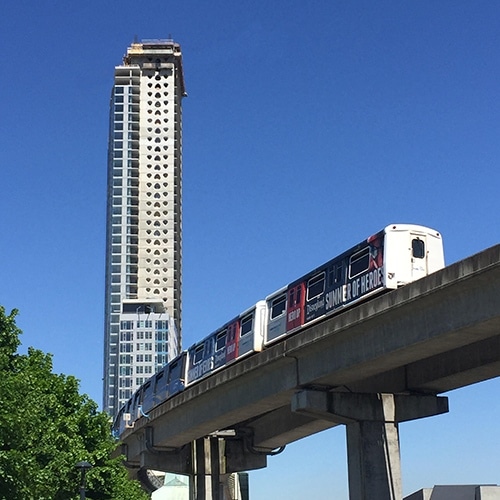How to Travel Sustainably While on Business
06 / 15 / 2017
Travelling to make a last-minute meeting across the country or jumping at an opportunity to meet a potential client can mean that your capacity to make sustainable travel choices gets sidelined by factors outside your control. Like when considerations such as efficiency, cost-effectiveness and getting there on time simply outrank your environmental values.
When in this situation, lots of eco-conscious business travellers are responding to this challenge by trying to book direct flights (saving on fuel-heavy takeoffs and landings), buying carbon offsets, or even just carrying a refillable water bottle to avoid plastic throwaways. Sometimes it doesn’t seem like much, but there’s no doubt every little bit helps.
And it helps for the simple reason that, according to a United Nations report, approximately 5% of total global greenhouse gas emissions each year come from the tourism sector. Transportation is considered to account for up to 75% of travel-related emissions, while accommodations are responsible for 20%. Other estimates are that upwards of 8 billion tonnes of CO2 is being produced each year by the hospitality sector.
But if there’s no alternative to that flight, focusing your efforts on making mindful choices upon landing is still worthwhile. And being careful in choosing where you stay can add up to some important savings in environmental impacts.
Using Design and Technology to Further Sustainability
In Surrey, BC, the Civic Hotel has been conceived from the ground up as a comfortable yet sustainable facility for business travellers. Built by Century Group, the company responsible for local residential developments like Southlands (featuring, among other things, a community farm, garden allotments, and cottage-style homes), this new-build facility was envisioned and constructed using the latest strategies and cutting-edge technologies in siting, lighting, bioclimatic design tools, and other design/construction innovations. Reflecting the core values of the Century Group, they’re also meant to align with the environmental concerns of its guests.
Reducing fossil-fuel emissions
With transportation being such a significant contributor to greenhouse gas emissions, taking public transit, car-sharing or using your own feet are no-brainers when you need to get to that business meeting or event. Consequently, the siting of the building you stay in is an important piece of maximizing the sustainability of your business trip.
This issue has been addressed by intentionally locating the Civic Hotel at the centre of a major urban transportation hub. The Hotel is one minute from local buses and a high-speed light rail (called Skytrain) station that will take you to downtown Vancouver in thirty scenic minutes, or anywhere across the Metro Vancouver, with handy connections to other rapid transit buses, ferries and the West Coast Express commuter train.
For guests who’d rather a car of their own, they’re invited to take part in any of the many local car-sharing networks, which offer stations near the hotel grounds. But best of all, the Hotel’s site at the heart of Surrey’s City Centre provides for easy, quick pedestrian access to all the civic, academic, financial and health-tech organizations populating this rapidly developing urban hub, as well as to local shops, restaurants, arts facilities and green spaces.
Reducing energy consumption through building design
The fact is that energy use typically accounts for approximately 60% of a hotel’s CO2 emissions. Most of that energy being consumed is used in the hotel’s heating, air conditioning, ventilation and cooling systems. So this means choosing hotels that use innovative technology when it comes to temperature regulation is your most sustainable option.
The design of the Civic incorporates an in-house utility system located within the hotel and adjoining residential tower. Heat is stored in water contained inside concrete columns and redistributed as required for the daily ebbs and flows in demand for cooling, warmth and domestic hot water. Any excess heat is sent via a closed loop to the City’s geothermal field located beneath the adjacent Civic Plaza, where it is stored, recycled and then redistributed back to the Hotel. The award-winning, geothermal district energy system (constructed by the City of Surrey) offers a single-source energy supply to all buildings adjoining Civic Plaza.
Inside the Hotel, the rooms are heated, cooled and ventilated using passive systems that are highly energy efficient. While it takes longer to heat or cool rooms, these passive, or ambient, systems avoid the energy demands associated with most traditional forced-air hotel systems. The need for heating and cooling is further mitigated by special glazing and solar shades on the windows, which serve as thermal barriers. These allow guests to open their windows while maintaining a steady temperature indoors.
Reducing Electrical Demands through Daylighting
According to research, energy consumption related to hotels is growing, almost 30% over the past decade, and is forecast to grow further. This is attributed, in part, to the growing use of electronic and operating equipment. With this trend unlikely to reverse, hotels can focus on reducing electricity use elsewhere. Lighting can account for as little as 4% of that energy consumption, yet it’s nothing to sneeze at and a valid consideration for business travellers.
Just as the Civic uses innovative passive heating systems, it employs a strategic use of daylighting techniques and LED technology to leverage available natural light in the lobby and event or meeting spaces. This increases comfort while reducing consumption of electricity for traditional lighting. In addition to providing all the health and psychological benefits provided by natural light, the strategic use of lighting technologies effectively manages the less desirable aspects of natural light by controlling for the glare and associated thermal effects, or excess heat.
So there’s always something you can do to lower your carbon footprint. Even if you can’t avoid that long flight, you can still make viable choices that contribute to a better world.

